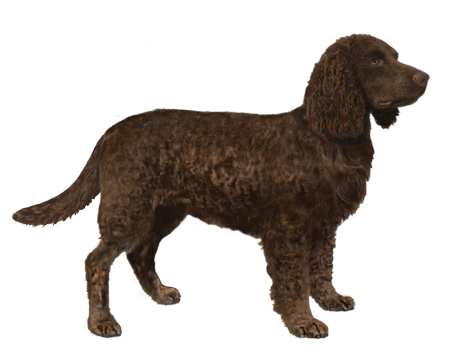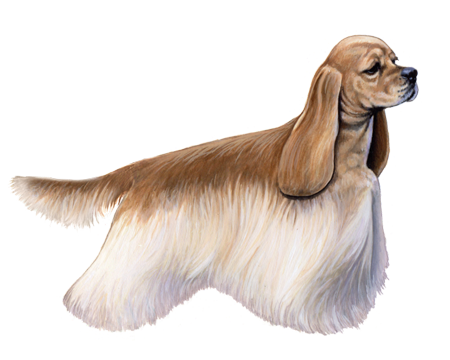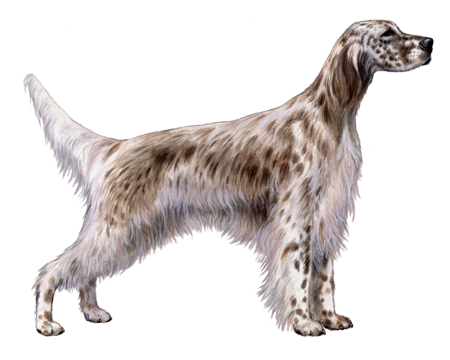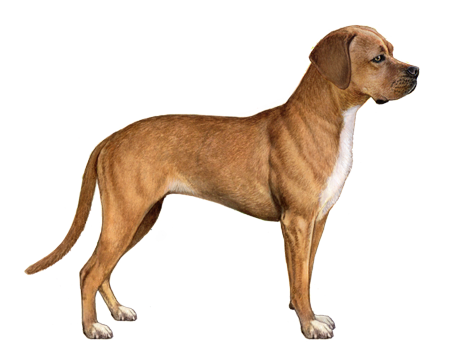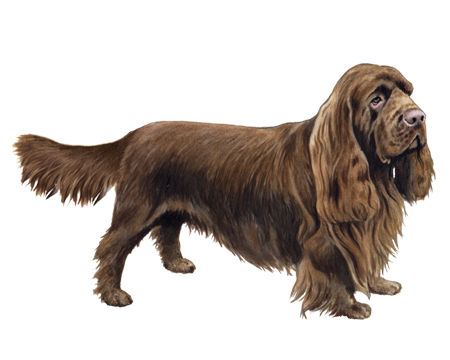
Spanish Water Dog
The Spanish Water Dog is a brave, intelligent, even-tempered, and athletic breed. These curly-coated dogs are skilled herders and retrievers. Another job Spanish Water Dogs excel at? Loyal family companion.
Interested in discovering if your dog is a Spanish Water Dog?
Check out Wisdom Panel's DNA tests.

Spanish Water Dog Traits
General Appearance
The Spanish Water Dog is a rustic-looking, sturdy, medium-sized, athletic dog with a distinctive curly coat.
Coat and Coloring
The Spanish Water Dog has a wooly curled coat that forms cords when it gets long. Solid-colored coats come in black, brown, or white. Bi-colored coats are white and black or white and brown.
Distinctive Physical Traits
Spanish Water Dogs appear alert and attentive, with expressive brown eyes that range from hazel to dark chestnut. They have triangular, drooping ears with rounded tips. Some Spanish Water Dogs are born with a naturally bobbed tail.
Spanish Water Dog Temperament
The Spanish Water Dog is a playful, upbeat, intelligent breed that's best-suited for experienced dog owners.
Spanish Water Dogs can make great family pets. They love attention from people, but typically bond most strongly with one member of the family. Their strong protective instincts make them effective guard dogs.
Though friendly with children, this breed shouldn't be left around them unattended. Spanish Water Dogs have powerful herding instincts and often can't help trying to "herd" kids, as well as other pets.
Also typical of herding dogs, Spanish Water Dogs can be workaholics. That means they thrive in environments with lots of activity and learning experiences. If they get bored, they may find something destructive to do just to stay busy.


Spanish Water Dog History
The Spanish Water Dog is an ancient breed known by many different names—including Perro de Agua Español, Perro Turco, and Perro de Lanas. And when it comes to this breed's origins, the theories are just as varied. But the most popular is that the Turks developed the Spanish Water Dog for use as sheepdogs.
Most experts believe wooly-coated water dogs that existed on the Iberian Peninsula in 1110 A.D. were the ancestors of the Spanish Water Dog. But it wasn't until the 1970s that Santiago Montesinos and Antonio Garcia Perez traveled around Spain collecting dogs to establish a breed standard.
Spanish Water Dogs have held a variety of jobs over the years—fisherman's helper, farmer's gundog, sheepdog, retriever, and more. They continue to herd sheep and goats in southern Spain to this day. The Spanish Government also uses them as search and rescue dogs and for bomb and drug detection.
The Spanish Water Dog initially joined the American Kennel Club's sporting group but moved to the herding group in 2011 after a request from the Spanish Water Dog Club of America.
Spanish Water Dog Care
Nutrition
Spanish Water Dogs need high-quality food that's appropriate for their life stage (e.g., puppy, adult, senior). Avoid accidental overfeeding by measuring meals. And be sure to include calories from treats when calculating their daily intake. As a general guideline, treats should make up no more than 10% of a dog's calories.
Grooming
The most important thing to know about a Spanish Water Dog's grooming needs is that their coat should never be brushed or combed.
To keep your dog clean, bathe them using a gentle shampoo, but never rub the coat vigorously during washing or drying. Instead, gently blot the coat with a towel or let it air-dry to prevent mats from forming. Spanish Water Dogs also need their hair clipped—ideally by a professional groomer—at least once a year.
Your Spanish Water Dog's nails will wear down some through regular activity. But you should still inspect them routinely for splits or cracks and trim as needed. Overgrown nails can be painful and could eventually lead to issues walking or running.
Finally, maintaining good dental hygiene is essential for the overall long-term health of all dogs, regardless of breed. In addition to scheduling professional dental cleanings, aim to establish an at-home routine that includes regular teeth brushing.
Exercise
Spanish Water Dogs require plenty of daily mental and physical activity. They're natural athletes that excel at dog sports—such as herding, agility, water work, flyball, and obedience training. Spanish Water Dogs are also great in the water. So, swimming or games of fetch in a lake or river are fun ways for them to burn off any pent-up energy.
Training
Spanish Water Dogs are very intelligent and eager to please. But you should use a gentle tone during training because this breed tends to shut down if training methods are too harsh. Reward-based training using favorite treats or toys is the secret to success.
Spanish Water Dogs may be wary around people they don't know. Socializing your dog early helps prevent this and other undesirable behaviors.

Spanish Water Dog Genetic Health Conditions
-
Chondrodystrophy (CDDY) and Intervertebral Disc Disease (IVDD) Risk
Chondrodystrophy (CDDY) is a skeletal disorder characterized by shortened limbs and abnormal early degeneration of the spinal discs, or intervertebral disc disease (IVDD), which predisposes to disc herniation.
-
Early-Onset Progressive Retinal Atrophy, (Discovered in the Spanish Water Dog)
Early-Onset Progressive Retinal Atrophy (EOPRA) is an eye disorder where the light sensing retina at the back of the eye deteriorates, causing impaired vision. The associated genetic variant has been identified in the Spanish Water Dog, and affected dogs are typically diagnosed with progressive vision loss before 4 years of age.
-
Hyperuricosuria
Hyperuricosuria (HUU) is a condition that predisposes affected dogs to the formation of urinary stones, such as kidney or bladder stones.
-
Neuroaxonal Dystrophy (Discovered in Spanish Water Dog)
Neuroaxonal Dystrophy is a neurodegenerative disorder. Signs of this disease include movement abnormalities, abnormal vocalization, incontinence, and behavioral changes.
Knowing if your Spanish Water Dog is a carrier or at-risk for these conditions can help you and your veterinarian plan for your pup’s lifelong care. With Wisdom Panel™ Premium, you can get results for over 200 genetic health tests.
Breed Group
Sporting
The sporting group breeds are incredibly diverse in personality and appearance, but can be characterized as very sturdy. They were developed to work closely with people and in general have a very responsive nature and high intelligence.




